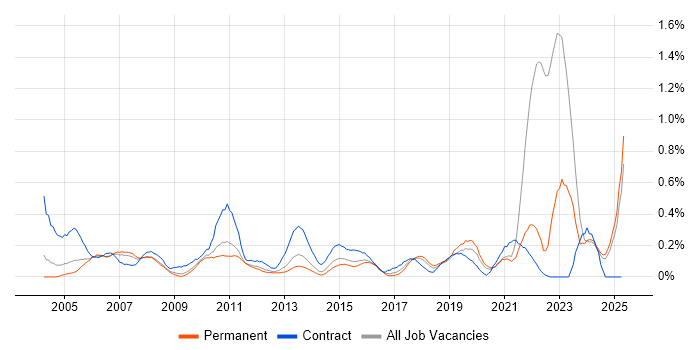Data Entry
England > East Midlands
The table below provides summary statistics for permanent job vacancies advertised in the East Midlands requiring Data Entry skills. It includes a benchmarking guide to the annual salaries offered in vacancies that cited Data Entry over the 6 months leading up to 10 May 2025, comparing them to the same period in the previous two years.
| 6 months to 10 May 2025 |
Same period 2024 | Same period 2023 | |
|---|---|---|---|
| Rank | 142 | 182 | 146 |
| Rank change year-on-year | +40 | -36 | +31 |
| Permanent jobs citing Data Entry | 7 | 12 | 32 |
| As % of all permanent jobs advertised in the East Midlands | 0.26% | 0.27% | 1.12% |
| As % of the Processes & Methodologies category | 0.28% | 0.34% | 1.17% |
| Number of salaries quoted | 7 | 4 | 0 |
| 10th Percentile | £26,600 | £17,575 | - |
| 25th Percentile | £27,250 | £19,938 | - |
| Median annual salary (50th Percentile) | £27,500 | £22,000 | - |
| Median % change year-on-year | +25.00% | - | - |
| 75th Percentile | £27,750 | £22,813 | - |
| 90th Percentile | £27,800 | £23,375 | - |
| England median annual salary | £30,000 | £27,000 | £40,000 |
| % change year-on-year | +11.11% | -32.50% | -5.88% |
All Process and Methodology Skills
East Midlands
Data Entry falls under the Processes and Methodologies category. For comparison with the information above, the following table provides summary statistics for all permanent job vacancies requiring process or methodology skills in the East Midlands.
| Permanent vacancies with a requirement for process or methodology skills | 2,460 | 3,521 | 2,734 |
| As % of all permanent jobs advertised in the East Midlands | 92.59% | 80.08% | 96.06% |
| Number of salaries quoted | 987 | 2,493 | 1,301 |
| 10th Percentile | £25,625 | £25,750 | £27,000 |
| 25th Percentile | £31,250 | £32,000 | £36,250 |
| Median annual salary (50th Percentile) | £45,000 | £45,000 | £50,000 |
| Median % change year-on-year | - | -10.00% | +5.26% |
| 75th Percentile | £60,000 | £56,250 | £65,000 |
| 90th Percentile | £68,750 | £68,750 | £76,250 |
| England median annual salary | £57,500 | £55,000 | £62,500 |
| % change year-on-year | +4.55% | -12.00% | +4.17% |
Data Entry
Job Vacancy Trend in the East Midlands
Job postings citing Data Entry as a proportion of all IT jobs advertised in the East Midlands.

Data Entry
Salary Trend in the East Midlands
3-month moving average salary quoted in jobs citing Data Entry in the East Midlands.
Data Entry
Job Locations in the East Midlands
The table below looks at the demand and provides a guide to the median salaries quoted in IT jobs citing Data Entry within the East Midlands region over the 6 months to 10 May 2025. The 'Rank Change' column provides an indication of the change in demand within each location based on the same 6 month period last year.
| Location | Rank Change on Same Period Last Year |
Matching Permanent IT Job Ads |
Median Salary Past 6 Months |
Median Salary % Change on Same Period Last Year |
Live Jobs |
|---|---|---|---|---|---|
| Nottinghamshire | +25 | 6 | £27,500 | +22.22% | 1 |
| Derbyshire | +18 | 1 | £26,750 | +67.19% | 4 |
| Data Entry England |
|||||
Data Entry
Co-occurring Skills and Capabilities in the East Midlands by Category
The follow tables expand on the table above by listing co-occurrences grouped by category. The same employment type, locality and period is covered with up to 20 co-occurrences shown in each of the following categories:
|
|
||||||||||||||||||||||||||||||||||||||||||
|
|
||||||||||||||||||||||||||||||||||||||||||
|
|
||||||||||||||||||||||||||||||||||||||||||
|
|
||||||||||||||||||||||||||||||||||||||||||
|
|||||||||||||||||||||||||||||||||||||||||||
